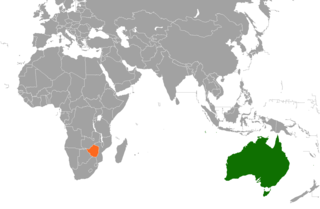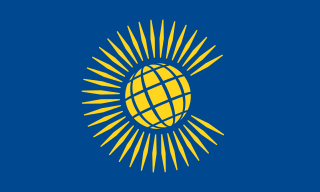The Commonwealth Heads of Government Meeting is a biennial summit meeting of the governmental leaders from all Commonwealth nations. Despite the name, the head of state may be present in the meeting instead of the head of government, especially among semi-presidential states. Every two years the meeting is held in a different member state and is chaired by that nation's respective prime minister or president, who becomes the Commonwealth Chair-in-Office until the next meeting. Queen Elizabeth II, who was the Head of the Commonwealth, attended every CHOGM beginning with Ottawa in 1973 until Perth in 2011, although her formal participation only began in 1997. She was represented by the Prince of Wales at the 2013 meeting as the 87-year-old monarch was curtailing long-distance travel. The Queen attended the 2015 summit in Malta and the 2018 summit in London, but was represented again by the Prince of Wales at the 2022 meeting in Rwanda.

Rhodesia, officially from 1970 the Republic of Rhodesia, was an unrecognised state in Southern Africa from 1965 to 1979. During this fourteen-year period, Rhodesia served as the de facto successor state to the British colony of Southern Rhodesia, and in 1980 it became modern day Zimbabwe.

A Commonwealth realm is one of a group of sovereign states within the Commonwealth of Nations that have the same person, currently King Charles III, as their monarch and head of state. All the realms are independent of each other, although one person, resident in the United Kingdom, acts as monarch of each. Except for the UK, in each of the realms the monarch is represented by a governor-general. The phrase Commonwealth realm is an informal description not used in any law.
The Commonwealth Secretariat is the main intergovernmental agency and central institution of the Commonwealth of Nations. It is responsible for facilitating co-operation between members; organising meetings, including the Commonwealth Heads of Government Meetings (CHOGM); assisting and advising on policy development; and providing assistance to countries in implementing the decisions and policies of the Commonwealth.

Hendrik Frensch Verwoerd, also known as H. F. Verwoerd, was a Dutch-born South African politician, scholar in applied psychology, philosophy, and sociology, and newspaper editor who was Prime Minister of South Africa from 1958 until his assassination in 1966.

Rhodesia's Unilateral Declaration of Independence (UDI) was a statement adopted by the Cabinet of Rhodesia on 11 November 1965, announcing that Rhodesia, a British territory in southern Africa that had governed itself since 1923, now regarded itself as an independent sovereign state. The culmination of a protracted dispute between the British and Rhodesian governments regarding the terms under which the latter could become fully independent, it was the first unilateral break from the United Kingdom by one of its colonies since the United States Declaration of Independence in 1776. The UK, the Commonwealth, and the United Nations all deemed Rhodesia's UDI illegal, and economic sanctions, the first in the UN's history, were imposed on the breakaway colony. With the help of the Commonwealth Secretariat, members of the Commonwealth were able to cooperate and advise Rhodesian Africans on policy. Amid near-complete international isolation, Rhodesia continued as an unrecognised state with the assistance of South Africa and Portugal.

The Head of the Commonwealth is the ceremonial leader who symbolises "the free association of independent member nations" of the Commonwealth of Nations, an intergovernmental organisation that currently comprises 56 sovereign states. There is no set term of office or term limit and the role itself has no constitutional relevance to any of the member states within the Commonwealth. The position is currently held by King Charles III. Head of the Commonwealth is also a title of the monarch of each of the Commonwealth realms according to the Royal Style and Titles Act.

The criteria for membership in the Commonwealth of Nations, which apply to current and prospective member states, have been altered by a series of documents issued over the past eighty-two years.

The London Declaration was a declaration issued by the 1949 Commonwealth Prime Ministers' Conference on the issue of India's continued membership of the Commonwealth of Nations, an association of independent states formerly part of the British Empire, after India's transition to a republican constitution.
The Langkawi Declaration on the Environment was a declaration issued by the assembled Heads of Government of the Commonwealth of Nations on the issue of environmental sustainability. It was issued on October 21, 1989, at Langkawi, Malaysia, during the tenth Commonwealth Heads of Government Meeting (CHOGM).

Foreign relations exist between Australia and Zimbabwe. Both countries have full embassy level diplomatic relations. Australia maintains an embassy in Harare, and Zimbabwe maintains an embassy in Canberra.

Foreign relations of South Africa during apartheid refers to the foreign relations of South Africa between 1948 and 1994. South Africa introduced apartheid in 1948, as a systematic extension of pre-existing racial discrimination laws. Initially the regime implemented an offensive foreign policy trying to consolidate South African hegemony over Southern Africa. These attempts had clearly failed by the late 1970s. As a result of its racism, occupation of Namibia and foreign interventionism in Angola, the country became increasingly isolated internationally.

Zimbabwe and the Commonwealth of Nations have had a controversial and stormy diplomatic relationship. Zimbabwe is a former member of the Commonwealth, having withdrawn in 2003, and the issue of Zimbabwe has repeatedly taken centre stage in the Commonwealth, both since Zimbabwe's independence and as part of the British Empire.

The Commonwealth of Nations, often simply referred to as the Commonwealth, is an international association of 56 member states, the vast majority of which are former territories of the British Empire from which it developed. They are connected through their use of the English language and historical-cultural ties. The chief institutions of the organisation are the Commonwealth Secretariat, which focuses on intergovernmental relations, and the Commonwealth Foundation, which focuses on non-governmental relations between member nations. Numerous organisations are associated with and operate within the Commonwealth. It is known colloquially as the British Commonwealth.

The 1973 Commonwealth Heads of Government Meeting, officially known as the II Commonwealth Heads Meeting, and commonly known as Ottawa 1973, was the second Meeting of the Heads of Government of the Commonwealth of Nations. It was held from 2 to 10 August 1973 in Ottawa, hosted by Prime Minister Pierre Trudeau. It was the first CHOGM to be attended by the Head of the Commonwealth, Elizabeth II.

Canada and South Africa established bilateral relations in the 1930s. Both countries are former British colonies and share similar cultures in terms of sports and language. Both countries are members of the Commonwealth of Nations.

The majority of the countries of the Commonwealth of Nations, formerly known as the British Commonwealth, still criminalise sexual acts between consenting adults of the same sex and other forms of sexual orientation, gender identity and expression. Homosexual activity remains a criminal offence in 29 of the 56 sovereign states of the Commonwealth; and legal in only 27.

The modern political history of Zimbabwe starts with the arrival of white people to what was dubbed Southern Rhodesia in the 1890s. The country was initially run by an administrator appointed by the British South Africa Company. The prime ministerial role was first created in October 1923, when the country achieved responsible government, with Sir Charles Coghlan as its first Premier. The third premier, George Mitchell, renamed the post prime minister in 1933.

The Rhodesian mission in Lisbon, the capital of Portugal, operated from September 1965 to May 1975. It was a diplomatic mission representing Rhodesia, initially as a self-governing colony of Britain and, after the Unilateral Declaration of Independence in November 1965, as an unrecognised state. Rhodesia informed Britain of its intent to open a Lisbon mission headed by an accredited representative, independent from the British Embassy in the city, in June 1965. Whitehall refused to endorse the idea but Rhodesia continued nonetheless, and later that month appointed Harry Reedman to head the mission. The British government attempted unsuccessfully to block this unilateral act—Rhodesia's first—for some months afterwards.

Relations between the UK and Zimbabwe have been complex since the latter's independence in 1980. The territory of modern Zimbabwe had been colonised by the British South Africa Company in 1890, with the Pioneer Column raising the Union Jack over Fort Salisbury and formally establishing company, and by extension, British, rule over the territory. In 1920 Rhodesia, as the land had been called by the company in honour of their founder, Cecil Rhodes, was brought under jurisdiction of the Crown as the colony of Southern Rhodesia. Southern Rhodesia over the decades following its establishment would slowly be populated by large numbers of Europeans emigrants who came to form a considerable diaspora, largely consisting of Britons but also smaller groups of Italians, Greeks and Afrikaners. A settler culture that had already existed since the time of company would come to cement fully and the white population began to identify as Rhodesians, often in conjunction with British/Afrikaner/Southern European identities of their ancestors. Southern Rhodesia would go on to participate heavily in both the First and Second wars, providing soldiers and military equipment to the British war effort.
















